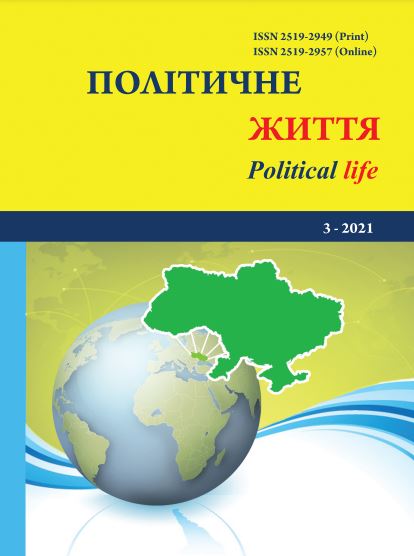Political legitimacy in the context of digital communication transformation
DOI:
https://doi.org/10.31558/2519-2949.2021.3.5Keywords:
political communication; communicative digital networks; discourse; political legitimacy; democracyAbstract
The article reviews the trends in the development of digital network communications and converged media during the Covid-19 pandemic aiming at determining their impact on the legitimization of political institutions and the formation of a new world order. The conclusions are based on the analysis of the new forms and channels of communication in digital networks, including messengers and Tik Tok. The author assumes that the further digitalization of communication networks is accompanied by a simultaneous decrease in public confidence in the communicative action due to infodemic and intentional exclusion of certain groups of people. The article reviews the "swipe culture" of information consumption and its influence on the formation of discourses. There is a trend of restricting freedom of communication through artificial intelligence and social network algorithms. As a result, users seek more privacy and switch to secure channels of communication, which does not promote search for public consensus and legitimization of political institutions. The concept of "digital anomie" is proposed, which is a prerequisite for the intensification of protest movements around the world. The peculiarities of the use of digital networks during such protests in 2020-2021 and the attempts of national governments to control digital communication are analyzed. The author concludes that no subject, including national governments, digital technology giants, individual actors or audiences are able to control relations of power in digital networks. This reduces the strategic potential of political institutions as major players in the world order, further weakening their influence on key issues of world politics to the point of losing the subjectivity of politics as such. The search for the legitimization ways of political institutions within the above trends is the subject of the further scientific research of the author.
References
Nations in Transit 2021: The Antidemocratic Turn. Freedom House. URL: https://freedomhouse.org/report/nations-transit/2021/antidemocratic-turn (date of access: 28.04.2021).
Guterres А. Tackling Inequality: A New Social Contract for a New Era. URL: https://www.un.org/en/coronavirus/tackling-inequality-new-social-contract-new-era (date of access: 25.02.2021).
Edelman Trust Barometer 2021. URL: https://www.edelman.com/trust/2021-trust-barometer (date of access: 12.01.2021).
Habermas J. The Structural Transformation of the Public Sphere: An Inquiry into a Category of Bourgeois Society. Cambridge: Polity Press. 1989. P. 326.
Mouffe Ch. On the Political. L-N.Y.: Routledge. 2005. P. 160
Castells M. Communication power. Oxford University Press; 2nd edition. P.571
Closely connected: social media`s role during Covid-19. URL: https://blog.gwi.com/trends/social-mediacovid-19/ (date of aсcess: 01.07.2020).
Managing the COVID-19 infodemic: Promoting healthy behaviours and mitigating the harm from misinformation and disinformation. World Health Organization. URL: https://www.who.int/news/item/ 23-09-2020-managing-the-covid-19-infodemic-promoting-healthy-behaviours-and-mitigating-the-harm-frommisinformation-and-disinformation (date of aсcess: 23.09.2020).
Covid-19: How Social Media Habits Are Changing. Brandwatch.com. URL: https://www.brandwatch.com/blog/react-social-media-habits-in-2020/ (date of aсcess: 27.10.2020).
2021 Digital News Report. Reuters Institute. Univercity of Oxford. URL: https://reutersinstitute.politics.ox.ac.uk/digital-news-report/2021/dnr-executive-summary (date of aсcess: 15.02.2021)
Digital 2021: The latest insights into the ‘state of digital’. Wearesocial.com. URL: https://wearesocial.com/blog/2021/01/digital-2021-the-latest-insights-into-the-state-of-digital (date of access: 27.01.2021).
You Now Have a Shorter Attention Span Than a Goldfish. URL: https://time.com/3858309/ attention-spans-goldfish/ > (date of access: 14.05.2015).
Mark Zuckerberg`s post. URL: https://www.facebook.com/zuck/posts/10104413015393571 (date of access: 11.01.2018).
Strategy Paper to Put a Spotlight on Artificial Intelligence and Freedom of Expression. Organization for Security and Co-operation in Europe. URL: https://www.osce.org/representative-on-freedom-of-media/456319 (date of access: 03.07.2020)
Recommendation No. R (97) 20 of the Сommittee of Ministers to member states on "hate speech". Council of Europe. URL: https://search.coe.int/cm/Pages/result_details.aspx?ObjectID=0900001680505d5b (date of access: 30.10.1997).
Telegram 2021 Audience Survey. URL: https://tgstat.ru/research-2021 (date of access: 07.06.2021).
Durkheim, É. The division of labor in society. New York, NY: The Free Press. 1984. P. 575
TikTok emerges as a political battleground in Navalny-stirred Russia. URL: https://techcrunch.com/2021/02/11/tiktok-emerges-as-a-political-battleground-in-navalny-stirred-russia/ (date of access: 11.02.2021).
Freedom on the Net 2018. The Rise of Digital Authoritarianism. URL: https://freedomhouse.org/report/freedom-net/2018/rise-digital-authoritarianism (date of access: 31.10.2018).

